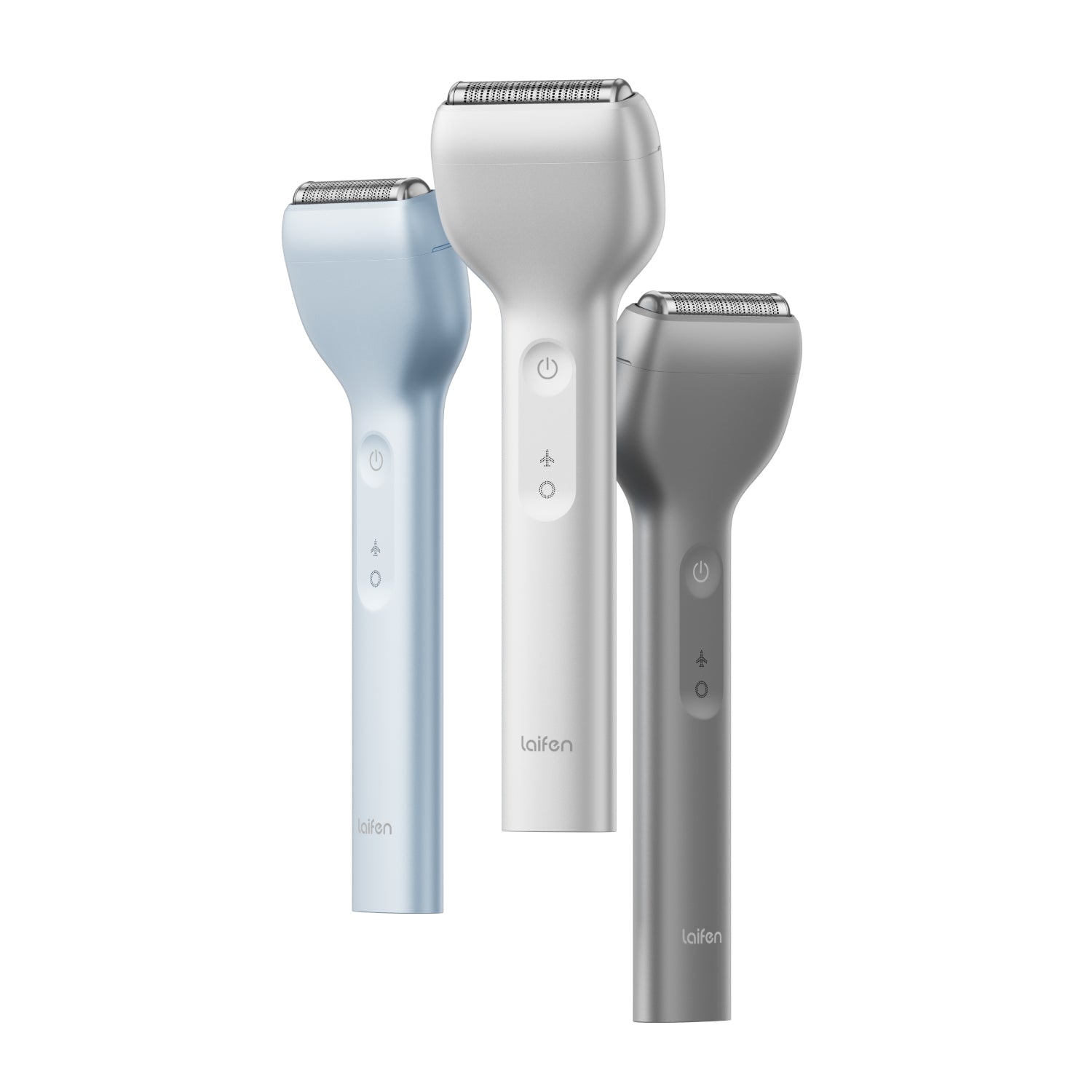
In this article
- Electric Toothbrush vs. Manual Toothbrush – Which is Better?
- Electric vs. Manual Toothbrush: Are Electric Toothbrushes More Effective?
- Electric vs. Manual Toothbrush: Pros and Cons of Manual Toothbrushes
- Electric vs. Manual Toothbrush: Pros and Cons of Electric Toothbrushes
- Electric vs. Manual Toothbrush: Which toothbrushes are recommended?
Each of us brushes our teeth at least twice a day, which is considered optimal. It's essential to remove plaque and tartar from teeth to prevent cavities and other oral issues. But which toothbrush is best suited for this task? The variety of toothbrushes is vast, with a significant distinction between manual and electric toothbrushes. The advantages of electric toothbrushes are numerous, which is why many dentists recommend them. In this article, we will take a closer look at the differences between manual and electric toothbrushes and also explore the benefits of electric toothbrushes.
Electric Toothbrush vs. Manual Toothbrush – Which is Better?
Experts generally agree that electric toothbrushes are superior for overall dental care. However, many people still prefer manual toothbrushes. If you aim for results similar to those of an electric toothbrush, you must use proper brushing techniques. Of course, it takes more time since you need to manually move your hand, which naturally operates slower than a motor. For gentler gum care, an electric toothbrush is often more suitable, especially if you have sensitive gums, in which case you should opt for a soft-bristle brush.
One advantage of manual toothbrushes is the cost. They are significantly cheaper than electric toothbrushes. Additionally, they don’t require charging or electricity, making them convenient for travel or areas with limited access to power.
What Types of Manual Toothbrushes are Available?

Manual toothbrushes have evolved from basic brushes with handles. Here are some factors that make a difference in performance:
Bristle Hardness: The sensitivity of your teeth will determine whether you should choose soft, medium, or hard bristles. It is generally recommended to use medium bristles for most people, but this depends on individual needs.
Brush Head Length: Manual toothbrushes come with both short and long heads. A short-headed brush has the advantage of reaching the back corners of the mouth more effectively.
Bristle Arrangement: The term "multitufted" refers to the way the bristles are grouped into clusters, which helps them reach the spaces between teeth more effectively. Bristles come in plastic, natural fibers, or microfiber, but natural fibers can have the drawback of harboring bacteria more easily.
Both manual and electric toothbrushes can offer good results if used properly, but understanding their differences helps in making the right choice for your dental care needs.
Electric vs. Manual Toothbrush: Are Electric Toothbrushes More Effective?

Yes, electric toothbrushes are generally more effective than manual ones, especially because they can clean teeth with minimal pressure, which is gentler on your teeth and gums. One of the key advantages of using an electric toothbrush is that it shortens brushing time, saving you about one minute per session compared to manual brushing.
Another benefit of electric toothbrushes is their ability to reach areas that are difficult or impossible to clean with a manual toothbrush. With a manual brush, you need to individually clean each tooth, whereas the rotating or vibrating heads of electric toothbrushes adapt to the shape of each tooth, making the process more efficient.
While electric toothbrushes provide significant advantages, proper brushing technique remains essential regardless of the type of toothbrush you use. It's important to move tooth by tooth before addressing the spaces between teeth and gum pockets. For optimal dental care, you should brush your teeth at least twice a day and use additional tools like dental floss for comprehensive oral hygiene.
Advantages of Electric Toothbrushes – Electric Toothbrush and Gum Care
Buying an electric toothbrush can be overwhelming due to the wide range of models available. However, electric toothbrushes offer several advantages over traditional manual brushes, making them a popular choice for maintaining good oral hygiene. One of the main benefits is their superior cleaning performance. The rapid movement of the brush head more effectively removes plaque and food particles than manual brushing. Studies suggest that electric toothbrushes can remove up to 30% more plaque, significantly reducing the risk of gum disease.
Another advantage of electric toothbrushes is their ease of use. Many models come with built-in timers that help you brush for the recommended two minutes, ensuring that all areas of your mouth receive adequate attention. Pressure sensors are also a common feature, preventing you from pressing too hard, which can protect your gums and reduce the likelihood of injury.
In addition to these features, electric toothbrushes often offer multiple modes tailored to specific needs, such as sensitive gums or teeth whitening. Some models even include Bluetooth connectivity, allowing you to track your brushing habits and receive personalized tips to improve your oral care routine. These features collectively enhance your dental care by providing a more thorough and personalized cleaning experience.
Electric vs. Manual Toothbrush: Pros and Cons of Manual Toothbrushes
We’ve looked into various pros and cons of manual toothbrushes, and here are some key points:
1. Brushing Technique
A manual toothbrush doesn't always provide a thorough clean by itself—the key is using the right brushing technique. To effectively remove food debris and plaque, a proper technique is essential. One recommended approach is the Bass brushing technique, which ensures comprehensive cleaning for both teeth and gums.

2. Teeth Cleaning
When used with the correct technique, a manual toothbrush can still deliver good results. However, one of the downsides is that manual brushing typically requires more pressure, which can lead to slight gum irritation. Additionally, it’s common for some teeth to be cleaned better than others with manual brushing, resulting in uneven cleaning across different areas of the mouth. Consequently, some teeth may be cleaner than others.
3. Manual Toothbrush Cost
Manual toothbrushes score high when it comes to cost. They are significantly cheaper compared to electric toothbrushes. In pharmacies, you can purchase a manual toothbrush for just a few euros. However, in the long run, manual toothbrushes may not always be the more cost-effective option. You also need to remember that a manual toothbrush should be replaced approximately every 8 weeks. If too many bacteria accumulate on the toothbrush, it can negatively impact oral hygiene.
Electric vs. Manual Toothbrush: Pros and Cons of Electric Toothbrushes
Electric toothbrushes come with several pros and cons:
1. Ease of Use
With an electric toothbrush, technology takes over the brushing technique. All you need to do is hold the toothbrush and guide it along your teeth. The cleaning action is performed by the device itself. It's important to clean each tooth individually and allow the brush to move between gaps. However, there's a potential risk of simply letting the brush glide quickly over the teeth, which reduces its effectiveness. Most electric toothbrushes, like the Laifen Wave, now come with built-in timers to ensure you brush for the right amount of time. Some models can also show which areas need further cleaning, helping you achieve a more thorough clean.

2. Teeth Cleaning
Electric toothbrushes have been proven to remove more plaque and bacteria compared to manual brushing. They are especially effective at gum care, as they are gentler on the gums. Using an electric toothbrush can help reduce inflammation and significantly decrease gum bleeding. Some models even have pressure sensors that light up when too much pressure is applied, which is a clear advantage for protecting gum health.
3. Electric Toothbrush Cost
Electric toothbrushes are not cheap. Prices can vary widely, ranging from €25 to €200. Additionally, brush heads need to be replaced every 3 to 4 months, which adds to the cost. However, manual toothbrushes also require regular replacement. It’s worth noting that more expensive electric toothbrush models do not necessarily guarantee better quality.
Electric vs. Manual Toothbrush: Which toothbrushes are recommended?
It can be said that electric toothbrushes are recommended. The reason is that electric toothbrushes are more effective, which is a significant advantage. The brush head rotates powered by electricity, performing over 1,000 movements per minute. This means the surface of the teeth is thoroughly cleaned. The intensity of the movement may vary depending on the model. Additional features also differ. We recommend using a model with a timer.
Due to the automatic process of electric toothbrushes, brushing becomes much easier.
Conclusion
Electric toothbrushes are becoming increasingly popular, with many manufacturers offering them in various designs. They provide effective teeth cleaning and ensure gum protection. Their rotating or vibrating brush heads are more effective at removing plaque than manual brushes. This thorough cleaning reduces the buildup of bacteria that lead to gum disease.
Using an electric toothbrush enables a more comprehensive cleaning. It helps to better remove plaque and prevent gum inflammation. Many models also offer pressure sensors to prevent over-brushing, and integrated timers ensure you brush for the recommended amount of time. Some brushes even have special modes for sensitive gums. All of this effectively supports your dental health. The only advantage of manual toothbrushes is that they are slightly cheaper. Once you understand the efficiency of electric toothbrushes, their benefits quickly become clear.
One electric toothbrush we can recommend is the Laifen Wave. It offers all the essential features at a reasonable price. You can order the toothbrush online directly.
















